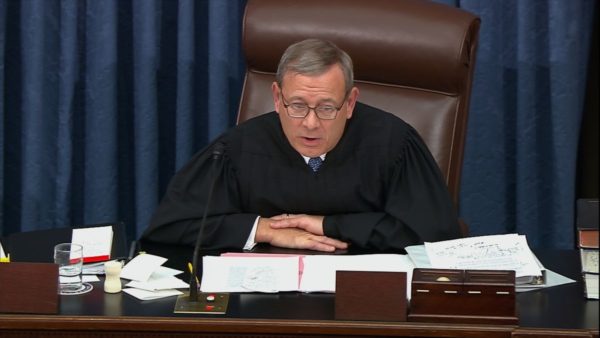
Attorney Scott Pilutik wrestles with the news of the day, from a lawyerly perspective…
As a matter of judicial politics, Chief Justice John Roberts played the Presidential financial records cases masterfully, writing two 7-2 opinions that had the full buy-in of the court’s liberal wing. He easily disposed of the President’s preposterous claims as to the executive office’s inviolability, sparing the court the indignity of endorsing Trump’s shit show. Yet, by remanding with further instructions to the lower courts, he provided the President with the likely means to run out the clock between now and November. Roberts is having a very Marbury v Madison term, issuing opinions that simultaneously giveth and taketh away, while reasserting the court’s place in the Constitutional scheme.
Given his genuine concern over the court’s perceived legitimacy as the non-political branch of government, Roberts was not going to be remembered as the Justice who simply handed over Trump’s tax returns to Congress (the Mazars case). Congress will eventually get its hands on Trump’s financial records but Roberts gave himself a way to quietly leave the party before the serious fighting broke out.
Roberts’ solution in Mazars was to create a four-part test that must be satisfied before Congress can subpoena a President (any Congress and any President). For centuries US Presidents have wrestled with Congress over the scope of the latter’s oversight role but had never simply stonewalled as Trump has, they’ve always reached an accommodation.
Faced with this unique stalemate, Roberts proposed a four-part test that must be met before any Congressional subpoena to a President can be recognized as valid. The language of the test is uncontroversial and recognizable to most lawyers as being pieced together from other areas. In short, Congress must (1) show that the documents aren’t available via other means; (2) narrowly tailor the request; (3) show a valid legislative purpose; (4) account for burdens on the Presidency the subpoena will impose.
Put your feelings about Trump aside for the moment, and you’ll recognize the test as common sense. Trump and his attorneys spend a lot of time equating Congress legitimately exercising its oversight role to “Presidential harassment,” but it’s plausible to imagine a vindictive Congress actually harassing a President without any guard rails in place. So I’ve got no problem with the substance of Roberts’ test.
But then Roberts loses me because he simply declines to apply the test, as I think most judges would have done. He never quite says that the test hasn’t, in essence if not in form, been met, he merely promulgates it as the appropriate analytical framework from now on.
So let’s apply the test, looking at the Circuit court’s opinion below.
(1) There was no discussion below as to whether the sought-after documents are available via other means, likely because it seems plain on its face that the President’s personal accountants are the exclusive possessors of his financial records. Had Congress subpoenaed the President in his personal capacity, this prong would become applicable. Roberts could have taken judicial notice of the quite obvious fact that a subtenant seeking the President’s financial records is properly directed when it’s directed to the president’s accountants. Check.
(3) (I’m leaving prong #2 for last because it’s the stickiest) the Circuit Court, reviewing de novo, “conclude[d] that the public record reveals legitimate legislative pursuits, not an impermissible law-enforcement purpose, behind the Committee’s subpoena.” Check.
(4) Similar to the first prong, the Circuit Court noted that Trump’s attorneys had implicitly accepted that Mazar‘s compliance with the subpoena did not “risk[] unconstitutionally burdening the President’s core duties.” Check.
(2) As to the scope of Congressional authority conduct investigations, authority that is “inherent in the legislative process,” the Circuit Court defined Congress’s power as “broad.” However, there was little discussion by the Circuit Court as to the particular subpoeana requests, which were in fact broad, covering practically all financial statements, including audits, supporting documents, and communications, prepared by Mazars for all Trump entities (except his campaign) from 2011-2018.
Roberts’ introduction of a “narrowly tailored” requirement is in tension with centuries of precedent establishing Congress’s “broad” authority to conduct investigations. Roberts expresses fears of a “limitless subpoena power” that would allow Congress to “aggrandize itself at the President’s expense.”
Roberts’ concerns are fair to a point, failing to mention that members of Congress are up for election every two and six years, and failing to mention the ways in which Congress’s concerns here are manifestly borne out by the voluminous record of Trump’s malfeasance.
Ultimately, all the factual ingredients were there in the record for Roberts to draw a line between Congress’s authority and his narrowly tailored requirement, but he ventures no further than declaring the line’s existence for us to now contend with. Some deem this Solomonic by Roberts, some cowardly, and while I respect the reasons why he stopped short I’m more inclined to think this was more of the latter.






